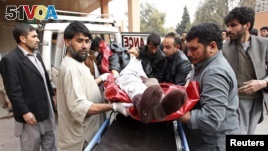19 February, 2015
The United Nations says conflict-related deaths and injuries among Afghan civilians rose last year. The UN says the number of civilian deaths and injuries was 22 percent higher than in 2013.
UN officials are blaming the Taliban and other rebel groups for most of the casualties. Officials say the higher numbers are a result of ground fighting between opposing sides in the Afghan conflict.
The UN Assistance Mission in Afghanistan this week released a report on civilian casualties in Afghanistan. It says the number of deaths and injuries last year was the highest in a single year since 2009.

A wounded Afghan man arrives at a hospital in Jalalabad after a suicide attack that targeted funeral-goers in Laghman province, Afghanistan, Jan. 29, 2015. (REUTERS/ Parwiz)
Georgette Gagnon is Director of Human Rights for the UN mission. She says intensified ground fighting between Afghan government forces and the rebels has produced the rise in casualties. She says the rebels have used weapons such as rockets, shells and grenades in and around population centers. She says the withdrawal of international forces and air support led to the increased fighting.
"The UN documented 10,548 civilian casualties in 2014. Civilian casualties from ground operations surged, making them the leading cause of civilian casualties and the biggest killers of Afghan women and children in 2014."
Georgette Gagnon says the UN report linked the Taliban and other Afghan government opponents to 72 percent of all civilian deaths. The report said the Afghan armed forces were linked to 14 percent of all deaths, and international forces to two percent. UN researchers could not identify which side was responsible for the rest of the deaths.
The human rights director says the second leading cause of civilian casualties was improvised explosive devices, commonly known as IEDs. Militants often used IEDs to attack Afghan or international forces.
The report also noted increased numbers of suicide attacks last year.
Ms. Gagnon spoke to reporters in Kabul. She read a message from the UN's human rights chief. The message said the attacks on Afghan civilians were unacceptable and could be considered war crimes. The statement called on all sides to respect international agreements.
"Documenting these trends should not be regarded as a body count, but as a vital step towards accountability. It is high time that states live up to their responsibility to protect civilians, and that perpetrators of war crimes and other violations understand that they will face justice for what they have done."
Nicholas Haysom heads the UN office in Kabul. He urged the Taliban to honor their public statements to avoid civilian casualties and stop attacking civilians.
"They (the Taliban) have accepted in their engagements with us that protection of the civilians is important and have pledged to take certain measures to eradicate civilian casualties from their own part. We have gratifyingly seen public commitments. Now is the time for results."
The Taliban has strongly rejected earlier UN findings that blamed the group for the majority of civilian deaths in Afghanistan. The Taliban accuses the United Nations of using only information provided by its enemies.
I'm Bob Doughty.
This report was based on a story from reporter Ayaz Gul in Islamabad. George Grow wrote this story for Learning English. Kelly Jean Kelly was the editor.
______________________________________________________________
Words in This Story
civilian - adj. not military
grenade(s) - n. a small bomb
surge(d) - v. to suddenly increase; rising sharply
accountability - n. taking responsibility